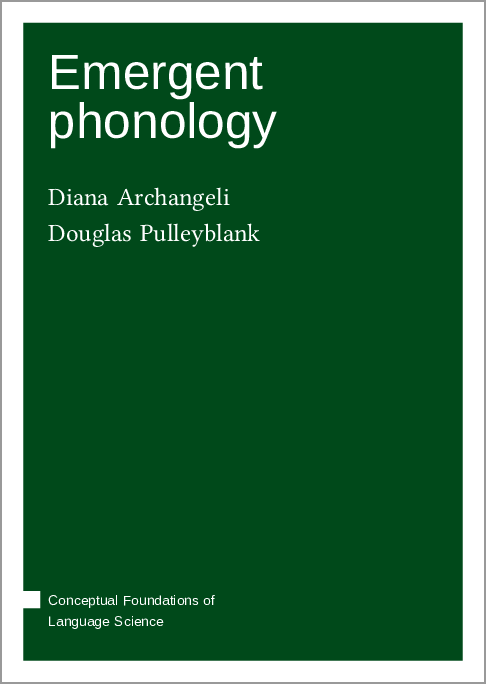We log anonymous usage statistics. Please read the privacy information for details.
Emergent phonology
Synopsis
To what extent do complex phonological patterns require the postulation of universal mechanisms specific to language? In this volume, we explore the Emergent Hypothesis, that the innate language-specific faculty driving the shape of adult grammars is minimal, with grammar development relying instead on cognitive capacities of a general nature. Generalisations about sounds, and about the way sounds are organised into meaningful units, are constructed in a bottom-up fashion: As such, phonology is emergent.
We present arguments for considering the Emergent Hypothesis, both conceptually and by working through an extended example in order to demonstrate how an adult grammar might emerge from the input encountered by a learner. Developing a concrete, data-driven approach, we argue that the conventional, abstract notion of unique underlying representations is unmotivated; such underlying representations would require some innate principle to ensure their postulation by a learner. We review the history of the concept and show that such postulated forms result in undesirable phonological consequences. We work through several case studies to illustrate how various types of phonological patterns might be accounted for in the proposed framework. The case studies illustrate patterns of allophony, of productive and unproductive patterns of alternation, and cases where the surface manifestation of a feature does not seem to correspond to its morphological source. We consider cases where a phonetic distinction that is binary seems to manifest itself in a way that is morphologically ternary, and we consider cases where underlying representations of considerable abstractness have been posited in previous frameworks. We also consider cases of opacity, where observed phonological properties do not neatly map onto the phonological generalisations governing patterns of alternation.
Reviews
-
Review in Phonology
by Shigeto Kawahara
published March 21, 2024
... [G]raduate students who have completed their introductory phonology course would benefit hugely from reading this book, as it will give them an opportunity to rethink if – and more importantly, why – we need to posit the mechanisms that are introduced in such introductory courses. Grownup researchers would likewise learn a lot from reading the book. It is unlikely that a reader will agree with every aspect of the book. But it is precisely this characteristic of the book that makes it readable: it forces us to pause for a moment and rethink whether and why theoretical postulates that we posit in phonological analyses are necessary. ...




